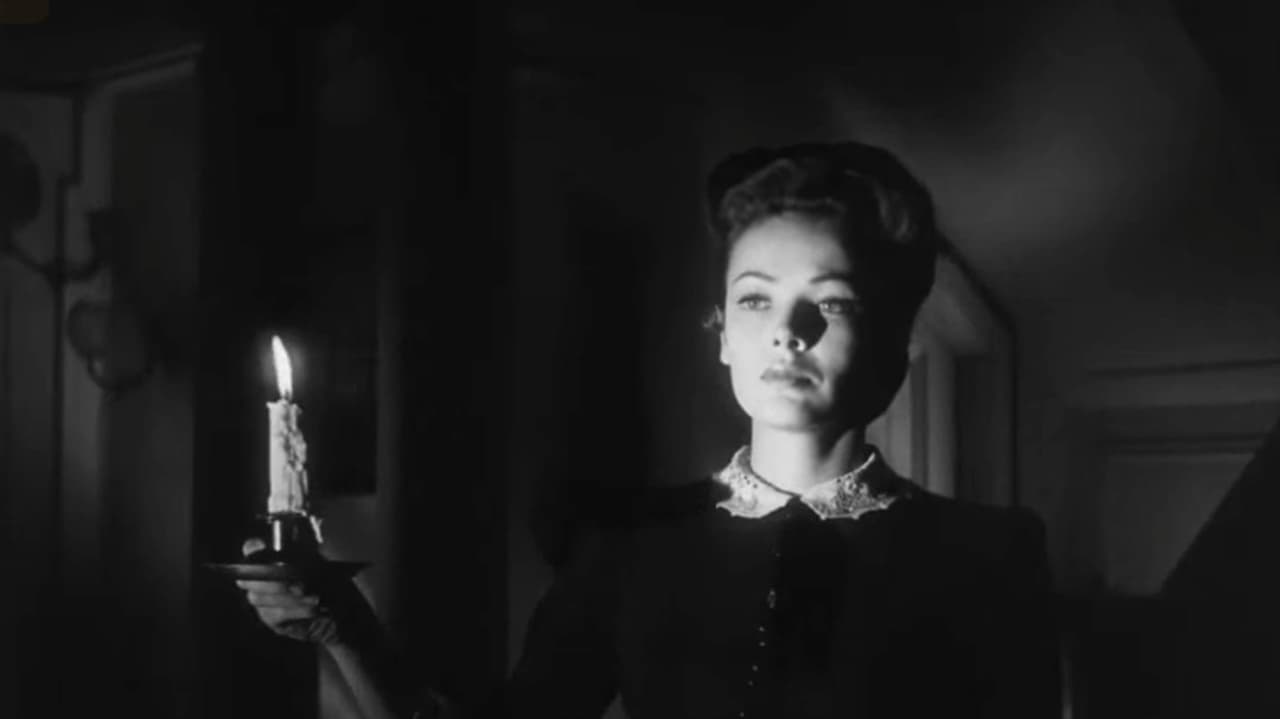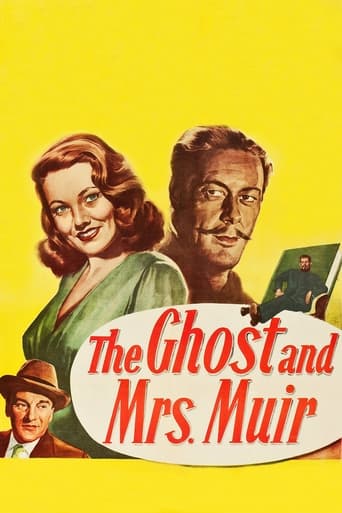jarrodmcdonald-1
I watched this one twice and had a lot of different thoughts/ideas about it. First, since it's a movie about a female writer (who is ghost-written by, well, a ghost)-- I was curious about the author of the original novel and who that might be. The credits at the beginning of the film just say R.A. Dick, which seemed suspiciously like a woman trying to be ambiguous. And sure enough, it's a pseudonym for an Irish woman named Josephine Leslie. So is Gene Tierney playing a woman based on Miss Leslie? I suppose we may never know, and it's only partially relevant to a discussion of the film and how things work on screen.But I do want to say a key component of the story and its effectiveness in cinematic terms is the characterization Tierney give us. Is she a woman with a masculine streak in her, represented by the ghost? Maybe she's a woman possessed by a man, which has been known to happen. The main theme is the creative process and it's told in the form of a supernatural romance drama which is most intriguing.Helping the story along is Rex Harrison's dynamic portrayal of the old sea captain. He has some of the best lines of dialogue I've heard lately. It's obvious the actor is having a ball and it's difficult to imagine anyone else playing it so well. Meanwhile, we have George Sanders in a subplot involving a man the widowed Mrs. Muir meets at a publisher's office one day. He outwardly pursues her, which causes the ghost to become jealous (which is a funny thing when you consider it), and in a way this takes us deeper into the collective psyche of both lead characters. I won't spoil how the relationship with Sanders' character ends for those who have not seen it yet, but it does give Tierney some great stuff to play. She does very well with it.There are other people who enliven the production. Natalie Wood is wonderful as Tierney's young daughter (why aren't child actresses this good now?)...and Anna Lee who appears in only one scene makes a lasting impression. I also liked the comic relief with the women from Mrs. Muir's family who try to convince her to leave the seaside village and move back home with them. Of course, their plans to control the situation don't stand a ghost of a chance.
disinterested_spectator
It is axiomatic that when a character in a movie falls asleep, there is a good chance that what follows is a dream, especially if that person falls asleep in a chair (falling asleep in a bed is too ordinary). And so, when Mrs. Muir, who is a widow, falls asleep in the chair of the allegedly haunted house she is renting, we are suspicious, especially when Captain Daniel Gregg makes an appearance. Is the ghost real, or is she just dreaming him?In any event, they get acquainted. And when she finds she is hard pressed for money, she becomes a ghost writer for this ghost, telling his story as a sea captain. When she falls in love with Miles Fairley, the captain decides to take his leave. He tells her while she is asleep that he is only a dream, and that she wrote the book herself. Now, is this a real ghost telling her this, or is she just dreaming that a ghost is telling her he is a dream?Years later, she sits in the chair and falls asleep again, and so once again we wonder if what follows is another (the same?) dream. The scene that does follow is one in which she finds out her daughter Anna is about to be engaged. Anna and Mrs. Muir have a talk in the kitchen, where it turns out that Anna had seen the ghost of Captain Gregg too, when she was a child, and they discuss whether they both saw a real ghost or simply had the same dream.This is followed by another scene many years later, in which Anna writes that her daughter, Little Lucy ("Lucy" being the same first name as Mrs. Muir), has married a captain (an airplane captain, but you get the idea). Mrs. Muir is tired and decides to take another nap in that same chair. She falls asleep and dies. Or she falls asleep and dreams that she dies. Or she is still in the first dream, and she dreams that she dies. And by now we are completely confused as to what is real and what is a dream.However we interpret this movie, it has a rather paradoxical attitude about marriage. On the one hand, it follows the usual Hollywood line for that period that marriage is essential for happiness. On the other hand, there is an undercurrent throughout the movie that marriage is not conducive to happiness. In the opening scene, Mrs. Muir announces to her mother-in-law and sister-in-law, with whom she is living, that she is going to get her own place and move out, along with her daughter and her maid. Her in-laws object, suggesting that it would be indecent. To this, Mrs. Muir responds, "I've never had a life of my own. It's been Edwin's life and yours and Eva's, never my own." Since there is no indication that her husband was a bad man, the implication would seem to be that there is something oppressive about marriage itself, that it involves the sacrifice of one's life for the sake of others.After Mrs. Muir rents the house, Mr. Coombe, the man who brokered the deal for her, comes to visit her intent on proposing marriage, saying that she needs the "protection of a man," which is absurd, coming from someone like him, with his high-pitched voice and nervous manner. Captain Gregg is disgusted, referring to him as a "herring-gutted swab," and gets rid of him by causing Coombe's car to start rolling away by itself.After Mrs. Muir writes the book, she takes it to a publisher, where she meets Miles Fairley. She falls in love with him. We are suspicious of him, because he is played by George Sanders, who often plays characters who are smarmy and decadent. She intends to marry him, but it turns out that he is already married with children. Worse yet, his wife knows that Fairley does that sort of thing to women on a regular basis, and it seems to be no big deal to her.In a subsequent scene, however, Mrs. Muir tells Anna she saw Fairley years later at a dinner party, where he cried because his wife had finally had enough and left him. She also mentions that he was "bald and fat." But if Fairley had turned out to be a decent man, and had married Mrs. Muir, he would still have become bald and fat, because that happens in a marriage, even a good one.When the old man carves Anna's name into a post on the shore, he tells her it will be there forever and a day. And yet, as the years pass, we see it slowly rot away and fall over. Is this not a metaphor for marriage, which begins with the illusion that love will last forever, only for it to slowly decay and fall apart?Now, we know that the idea is that for a woman to be happy, she must marry the right man, and the right man in this case is Captain Gregg. And so, at the end of the movie, when she dies, and she and Captain Gregg are together again, apparently forever, we know that she is finally happy. And she and Gregg both have their good-looking, youthful appearance, forever apparently. In other words, Gregg will never become "bald and fat."The three real men in Mrs. Muir's life, her husband Edwin, Mr. Coombe, and Miles Fairley, were not suitable for her for different reasons, and only a dream-ghost was the right man. The message seems to be that a truly happy marriage is itself a dream, and that in real life, one is better off remaining single. As Mrs. Muir says to her daughter, "You can be much more alone with other people than you are by yourself, even if it's people you love."

